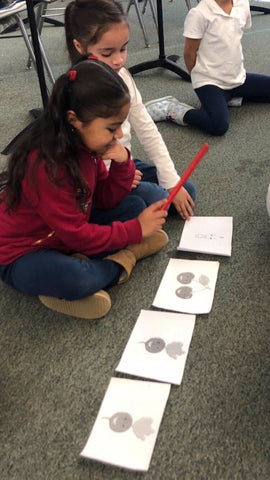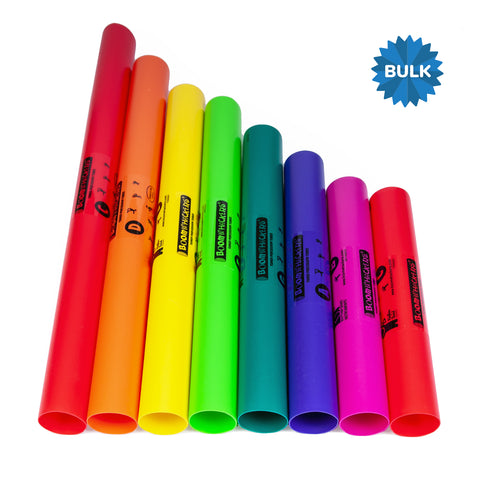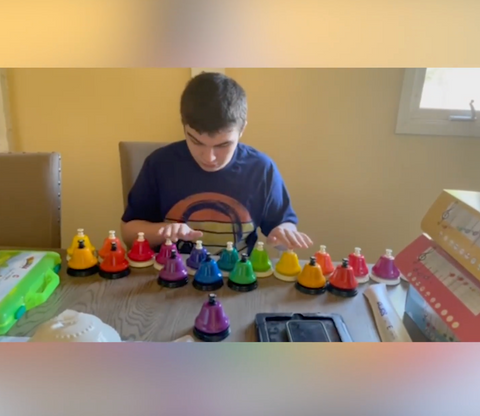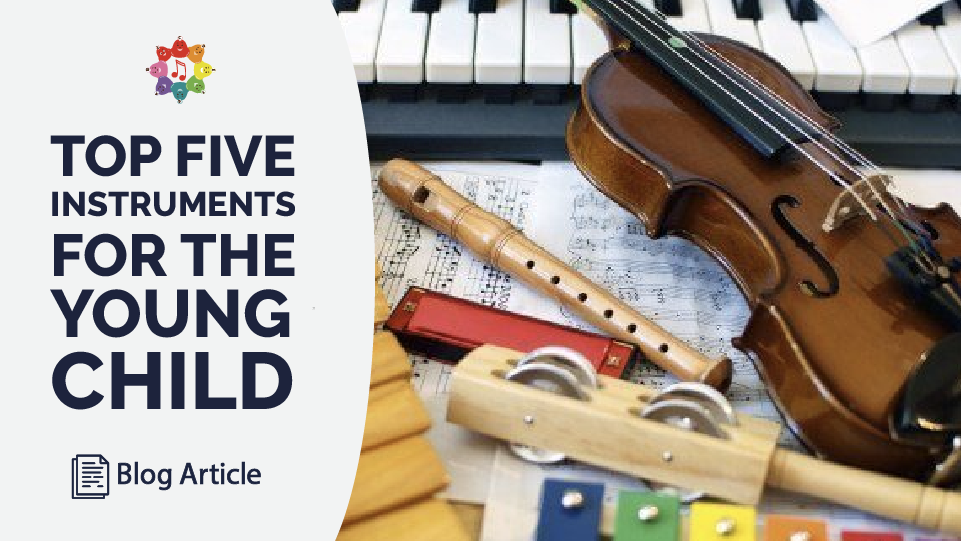The short version: Top 5 Instruments for Young Kids are…
5) Drums – they’re fun, high energy and physical, BUT they don’t give young kids meaningful exposure to pitch during early childhood
4) Ukulele – for kids wanting to learn guitar, Ukulele is A LOT easier on young hands and it will be more fun, less painful, and lead to lifelong guitar skills
3) Chromanotes Xylophones and Boomwhackers – color coded instruments like these are perfect for young kids, though the Boomwhackers are hard to play as one person and xylos require accuracy with a mallet to play which is a difficult element for young kids
2) Piano – the ultimate instrument for all ages, piano is GREAT for young kids but it can be a little difficult on tiny fingers and it has A LOT of black and white keys that are hard to distinguish from one another. We suggest this Casio Light Up keys for beginners
1) Chromanotes Deskbells – easy to play, colorful, durable, well tuned and perfect for play with just a few notes at a time, these Deskbells make the #1 instrument for young kid. Available on: Amazon, Rhythm Band, Music in Motion & Optimum Percussion
Learn more about each instrument below! Cheers! – Mr. Rob
As a musician, a classroom teacher and a music teacher, I often have parents ask me what instruments to buy for their children.
For years, I went with the generic suggestion of “whatever your child seems most drawn to.”
And while it’s important to adapt curriculum and materials to meet your child where they’re at, simply giving your child free reign over what their first instrument is NOT the method for getting the best results out of your child’s formative musical years.
Most kids for one reason or another, end up gravitating toward the guitar or the drums. Maybe it’s the loudness of the drums, the popular nature of the guitar, or because it’s what their dad plays.
But to make the most of your child’s critical period for auditory development (the formative language years between birth and age ~7), there are more ideal starter instruments than the drums or the guitar. And as amazing as the piano is, there’s a starter instrument that’s even better.

Shop Kids Instruments
Let’s take a look at the Top 5 Instruments for Young Children — the pros and the cons of each — as we make our way toward the ideal starting instrument for young kids.
5. Drums

The drums start this list at Number 5 by simultaneously being the best AND the worst instrument for a Young Musician. Here’s why:
Pros
- Percussion and drums (like the bongos pictured above) are an easy instrument to start on. You hit it and it makes a sound. Tah dah!
- Because drums only have one (or a few) sounds, they are predictable and consistent, which is pleasing to young children.
- The loudness and the heartbeat like pulse that comes with banging a drum is a very human and powerful force.
- Drums are the most gross motor of the instruments, which allows for a lot of energy and movement to be channeled through the drums.
While I highly recommend that every child have some drums in their life, and while I personally enjoy and perform on the drumkit more than any other instrument, only giving your preschooler drums is doing them a disservice. From birth until age five, children undergo massive auditory growth. Therefore, they are uniquely equipped to build their sense of pitch, which makes the need for a tonal instrument (one that plays notes like C, D, E, etc) essential.
4. Ukulele

Many children gravitate toward guitar and there are many child-guitar products out there. The ukulele is a great way to start because it’s one of the easiest stringed instruments to play. Ukulele’s have four string instead of six and many of the chords only require one or two fingers to play. For a kid that’s between ages 5-7, the Uke is a great starting instrument (and learning Uke is all the rage these days).
3. Boomwhacker Xylophone or Chromanotes Resonator Bells

Shop Boomwhackers

Shop Resonators
Both of these color coded xylophones are a great way to give children meaningful exposure to individual notes.
Pros
- The benefits of the Boomwhacker Xylophone (first picture above) are that they are inexpensive. Also, the tubes can also be held and swung like a stick to produce pitch.
- The resonator bells have a clear pitch and a long sustain, which is helpful for learning and identifying pitch.
- Both instruments follow the Chromanotes (TM) system which we highly recommend for Young Musicians. Both instruments are also a collection of individual pieces that can be manipulated or organized in their own right, which is good for limiting a child to two or three simultaneous notes.
- Both of these instruments are great for slightly older kids (3-6) or for teachers that want to split the 8 notes among a group of kids. The need for a stick to play them as a xylophone is indeed a little difficult but it’s also not out of your child’s reach. If it weren’t for the instrument at Number 1, I would definitely recommend these.
2. The Piano (or keyboard)

The piano comes in at Number 2 because of it’s broad musical application and because it is time-tested and true as an powerful first instrument.
Pros
- From fine motor coordination to a musical ear, the piano builds a wide range of musical skills. Knowledge of the piano converts to knowledge of a MIDI Keyboard, which many producers and technologists use as their primary musical instrument when composing on a computer.
- Most important for preschoolers is that the one-to-one nature of the piano. Like a drum, a child hits a key and a sound comes out. There is no stick to swing, no pick to use, no bow to master, no simultaneous pressing and plucking. Press it and it goes.
- Though the different black and white keys don’t make reading the pitches of a piano easy for a child, some Chromanotes Stick-On’s on will make the different notes of the piano easier to identify.
Summary
I recommend playing the piano to everyone… everywhere… always. It’s never too late to learn and it’s never too early to star and it is the best instrument for visualizing the relationship between notes, chords, and scales.
Despite it’s all around awesomeness, there’s still one better option for your Young Musician. Drum roll please…
1. C Major Deskbells – Chromanotes Instrument for Early Childhood Development

For several reasons, the best starting instrument for a Young Musician is a set of the C Major Deskbells.
There are numerous advantages to Chromanotes desk bells that make them the ideal starting instrument for a child. There are also a few disadvantages, that can be remedied with a few tricks and tips.

Pros
- The bells are color coded, which makes them easy to identify. Most children learn to identify and communicate basic colors before they can do the same for individual letters of the alphabet; therefore, they will find the red bell much faster than the C bell.
- Like the piano or a hand drum, the bells are a one-to-one experience for a child. There is no stick to swing, no bow to master, no string to press and pluck. Their ease of play means more time spent getting predictable responses from individual notes.
- They are tuned to the C-Major scale, which is the simplest scale to learn on the piano as well as the scale most often used in early music methods, Fixed-Do systems and other perfect pitch methods.
- Where the piano and the guitar have dozens of notes on them, there are only eight notes in this bell set. This is much less overwhelming to a child. It also means they have a higher chance of finding the note they are looking for, which means more successes and more learning moments.
- Each bell is an individual object, which means you can focus on as few or as many bells as you want. Limiting a child to one or two or three bells will help them to focus on each bell’s pitch. Better yet, you eliminate every parent’s favorite sound of the child smashing all the piano keys at once.
- You also get the ability to move them, use them in free play (very powerful), have a catch with them, and group them in different ways to illustrate different intervals, chords, and patterns.
- Finally, they have a clear and simple timbre that rings out well, which makes the pitches easier to detect.
Shop Deskbells
I cannot recommend these bells enough!! Use them in free play, use them as musical cues, and play listening games with them!


